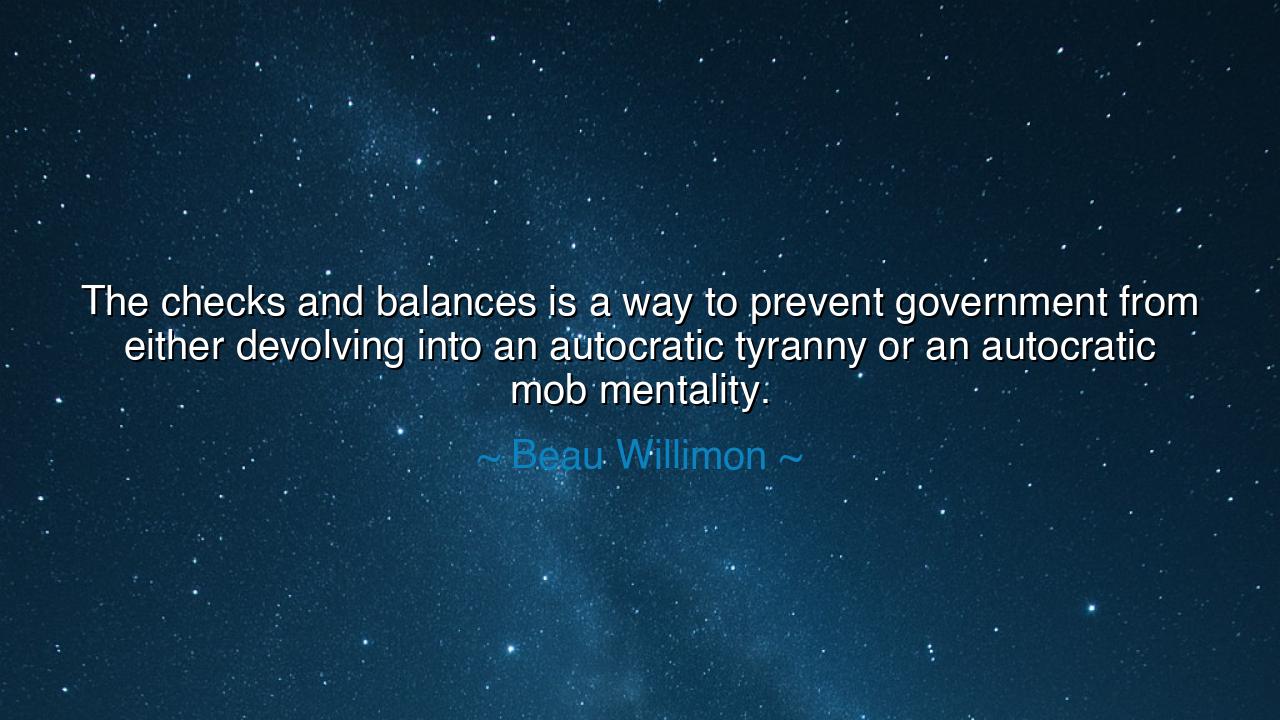
The checks and balances is a way to prevent government from
The checks and balances is a way to prevent government from either devolving into an autocratic tyranny or an autocratic mob mentality.






The words of Beau Willimon — “The checks and balances is a way to prevent government from either devolving into an autocratic tyranny or an autocratic mob mentality.” — echo like an ancient warning carved upon the stones of democracy. In this modern phrasing lies a truth as old as civilization itself: that power, when left unrestrained, will always tilt toward corruption and chaos. Willimon, though known as a dramatist of politics, here speaks as a philosopher of governance. His words remind us that freedom is not sustained by goodwill or passion alone, but by structure, discipline, and restraint. The design of checks and balances — that intricate dance of authority and opposition — is the very heart of self-government, ensuring that no one man, and no single crowd, may command all power.
The origin of the idea that Willimon invokes reaches back to the wisdom of the ancients. Long before the American Republic was born, Aristotle warned that every government carries within it the seeds of its own corruption: monarchy into tyranny, aristocracy into oligarchy, democracy into mob rule. The Founding Fathers of the United States, steeped in these lessons, sought to create a system where such decay could be delayed, if not defeated. They looked to Montesquieu, who wrote that liberty could only exist where power was divided — where the executive, legislative, and judicial branches might check and balance one another. From this philosophy arose the American Constitution: a living mechanism designed not to prevent conflict, but to channel it, that through tension, freedom might endure.
In Willimon’s words, two great dangers are named: the autocratic tyranny of the ruler and the autocratic mob mentality of the ruled. These are the twin shadows that have haunted all democracies. The first arises when a single will — the king, the dictator, the demagogue — seizes the machinery of state and bends it to personal desire. The second is more subtle, yet equally deadly: when the masses, inflamed by emotion, sweep aside law and reason, demanding instant power without reflection. Both forms of autocracy destroy balance; both silence dissent; both extinguish liberty. And so, the system of checks and balances serves as the sacred middle path — the shield of structure against the storms of passion.
History is rich with examples of this balance tested and broken. In ancient Rome, the Republic fell when checks gave way to ambition. The Senate, once the conscience of the state, became the servant of power, and Julius Caesar, beloved by the people, rose as a savior only to become a master. The mob cheered; the Senate yielded; and in their unity, they destroyed their freedom. The Republic’s laws had been designed to restrain both ruler and crowd — but when those restraints were ignored, Rome traded liberty for empire. Willimon’s warning speaks to this eternal pattern: when a nation forgets to guard its balances, it invites the return of chains.
Yet the lesson is not only of ancient times. Even in modern ages, nations have stumbled into tyranny and hysteria when balance gave way to fear or fervor. In the twentieth century, many societies, disillusioned with democracy’s slowness, embraced the false clarity of autocrats — men who promised efficiency, unity, and greatness. But from that promise came only ruin. Others, swayed by populist rage, tore down institutions in the name of the people, only to find that chaos filled the void. Thus, history bears witness that liberty does not die in an instant; it dies in increments — when one branch grows complacent, when citizens cease to question, when law becomes a weapon rather than a guide.
Willimon’s insight, therefore, is more than a reflection on government; it is a call to vigilance. For checks and balances are not merely written into parchment — they must live in the conscience of the people. The courts, the legislature, the presidency — these are but mirrors of the nation’s own virtue. When citizens cease to hold power accountable, when they worship leaders or surrender to collective fury, the system decays from within. Democracy survives not through perfection, but through participation — through the daily labor of balancing freedom with responsibility, emotion with reason, and passion with principle.
Let this be the lesson, O listener: that every citizen is a guardian of the balance. You cannot depend solely on leaders to restrain themselves, nor on institutions to function without the nourishment of truth and courage. Be wary of the seduction of certainty, whether it comes from a tyrant’s command or a crowd’s cry. Defend the tension between powers, for that tension is the heartbeat of liberty. Support laws that limit authority, but also practice patience with the processes that preserve them. For a government without checks is a beast untamed; and a people without reason are a fire without control.
And so, remember the eternal wisdom hidden in Willimon’s words: freedom is not sustained by passion, but by balance. The mightiest republic can collapse into despotism or madness if its people grow careless. But a nation that honors its boundaries, that embraces the discipline of disagreement and the restraint of power, will endure beyond empires. Let every generation renew this covenant — that liberty, once won, shall never again be lost to the hands of a tyrant or to the noise of a mob.






AAdministratorAdministrator
Welcome, honored guests. Please leave a comment, we will respond soon